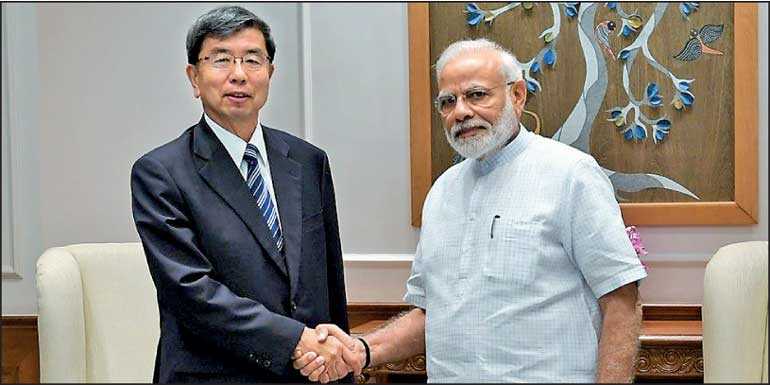Friday Feb 20, 2026
Friday Feb 20, 2026
Saturday, 31 August 2019 00:10 - - {{hitsCtrl.values.hits}}

Asian Development Bank (ADB) President Takehiko Nakao on Thursday met with India’s Prime Minister Narendra Modi for the third time since the latter took office and pledged to support the Government’s new flagship initiatives.
He also met with Finance and Corporate Affairs Minister Nirmala Sitharaman, Minister of Road Transport and Highways and Micro, Small, and Medium Enterprises (MSME) Nitin Gadkari, and Minister of Railways and Commerce and Industry Piyush Goyal.
The Prime Minister and Nakao discussed how to further enhance the partnership in areas such as the promotion of new technologies and innovation, renewable energy, solar-pump irrigation, electric vehicle and battery, fintech, sustainable tourism, and the recycling of plastics.
At his meeting with the Prime Minister, Nakao commended the Government’s vision to make India a $5 trillion economy during Modi’s second term, and reaffirmed ADB’s commitment to helping bolster the country’s inclusive growth and rapid economic transformation to achieve this vision.
“India is one of the fastest growing economies in Asia and the Pacific, maintaining a growth rate of about 7.5% on average in the last five years. ADB expects the country’s growth in 2019 at 7.0% and in 2020 at 7.2%, despite downside risks in the global economy,” said Nakao at his meetings with the Indian leadership. “The Government needs to maintain prudent macroeconomic management, sustain its reform efforts, enhance industrial competitiveness and job creation, and rejuvenate the rural economy.”
Nakao also commended the Government’s key reforms, such as the introduction of goods and services tax to make India a single market, the implementation of Insolvency and Bankruptcy Code 2016, capital infusion for banks, the improvement of business regulation, and its further opening to foreign direct investment, which are yielding results. He encouraged the government to sustain the momentum of reforms in areas such as labour laws, land acquisition, and consolidating various welfare schemes.
ADB’s sovereign lending to India in 2018 reached a record $3.0 billion, in transport, urban, irrigation, skills development, and intermediary finance for public–private partnerships. Nakao said he appreciated the country’s speedier implementation of projects. He emphasised the bank’s commitment to catalysing private sector investments and announced a $100 million investment in the National Investment and Infrastructure Fund. In May 2019, ADB made its single largest non-sovereign loan to date by committing $ 750 million to the Indian Railways Finance Corporation to support the electrification of existing railways tracks.
Nakao said ADB stands ready to commit more than $ 12 billion lending in the next three years, 2020–2022, averaging annually over $3 billion for sovereign operations and $1 billion for non-sovereign operations.
ADB’s sovereign and non-sovereign operations will focus on the Government’s major initiatives, including (i) the Jal Jeevan Mission (extending drinking water for all, water conservation, and more crop per drop); (ii) the East Coast Economic Corridor program; (iii) promoting competitiveness of micro, small, and medium-sized enterprises by connecting to global value chains; (iv) supporting national road safety programs; and (v) constructing a rapid rail transit system to connect Delhi with neighbouring satellite cities, starting from Delhi to Meerut. ADB will also expand assistance in secondary education and the universal health system.
Nakao lauded the Government’s ‘Act East’ policy, particularly its thrust to integrate the north eastern region with neighbouring economies, including countries in Southeast Asia. India also actively participates in the South Asia Subregional Economic Cooperation (SASEC) program—a partnership initiated in 2001 by ADB now including Bangladesh, Bhutan, India, Maldives, Myanmar, Nepal, and Sri Lanka. India is hosting the first SASEC Finance Ministers’ meeting in March 2020.
Nakao will travel to Kolkata, where he will attend the launch of an ADB publication tomorrow that showcases ADB’s 20-year partnership with the Kolkata Municipal Corporation. The partnership has been helping improve the city’s water supply, sewerage, and drainage systems, while also building resilience through the introduction of early flood warning system.
India is an ADB’s founding member since 1966 and is now its biggest borrower. ADB has committed $39.7 billion in sovereign lending and $5.7 billion in non-sovereign lending and investment by June 2019.